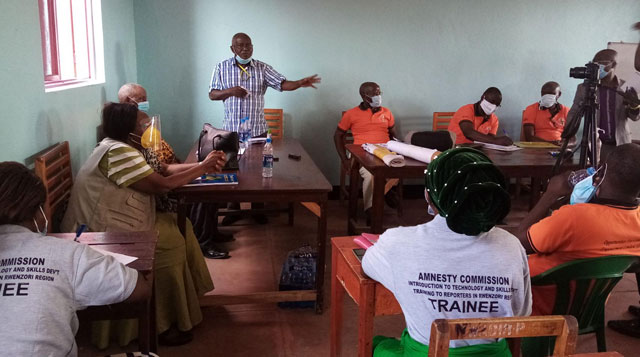
Kasese, Uganda | THE INDEPENDENT | Former fighters of the Allied Democratic Forces –ADF in Kasese district are undergoing technology and skills development training lessons, thanks to the Amnesty Commission.
The three-day training taking place at Nadir preparatory school in Mumbuzi cell, Nyakasanga Division has attracted over ADF reporters from the districts of Kasese, Bundibugyo, Bunyangabu and Ntoroko.
Rwenzori region, the former base of the Allied Democratic Forces has remained a volatile area despite the repulsion of the ADF out of Uganda decades ago. And, the re-occurrence of conflict has partially been blamed on the presence of reductant ex-combatants who are being exploited by wrong elements.
Henry Basaliza, a demobilization and resettlement officer with Amnesty Commission told URN that the Amnesty Commission is working with other partners to train the ex-ADF rebels in interlocking stabilized soil block technology, craft making and tailoring for economic integration.
He adds that the training will equip the selected group with skills that they will pass on to others for community development.
Basaliza added that the training is also part of the process for the reintegration of former rebels and host communities. The project will be spread to other areas in the country.
Msgr. Timothy Kisembo Apuuli who heads the western Region says that after the training; the government will procure brickmaking machines for the trainees.
Christine Muhindo, the special presidential advisor on Rwenzori Affairs challenged the ex-rebels to create peace within themselves and in the region, which has lost a lot to external conflicts. Muhindo is optimistic that once the group has opportunities to work, they will have no time to indulge in acts of war.
Abdu Katusabe Kyalimpa, one of the ex-rebels from Bundibugyo wants the government to give them capital so that they can be in a position to start their own businesses.
Kyalimpa says that he attained skills in a previous training in carpentry and joinery but has failed to start due to lack of capital.
The Amnesty Act has three main functions: providing amnesty to rebels who renounce rebellion and give up arms, facilitating an institutionalized resettlement and repatriation process and providing reintegration support, including skills training for ex-combatants, and promoting reconciliation.
The act also establishes an Amnesty Commission tasked with operationalizing the act that including demobilizing legally armed soldiers. 27,000 reporters have been pardoned since the act was put in place.
********
URN
 The Independent Uganda: You get the Truth we Pay the Price
The Independent Uganda: You get the Truth we Pay the Price





